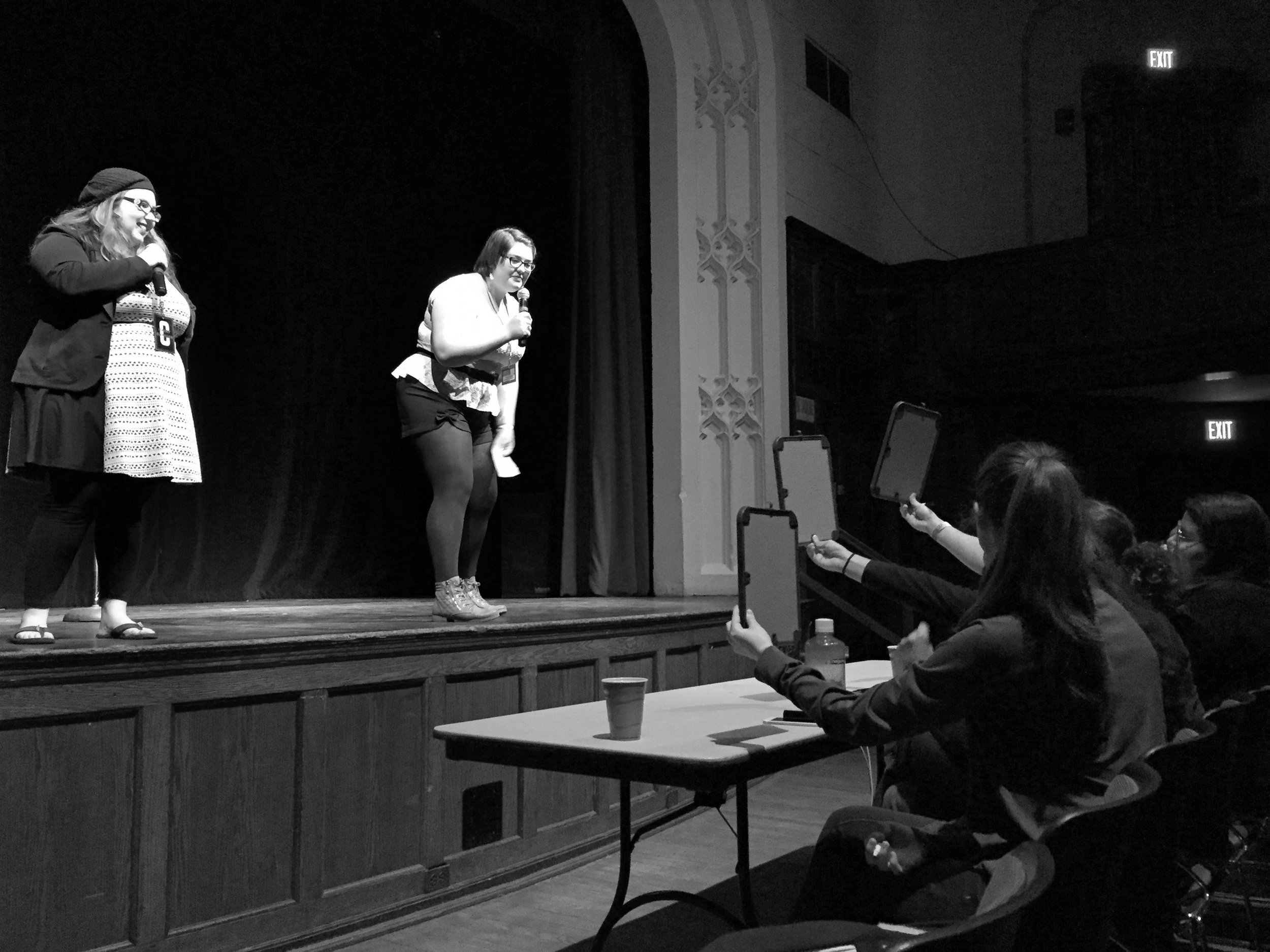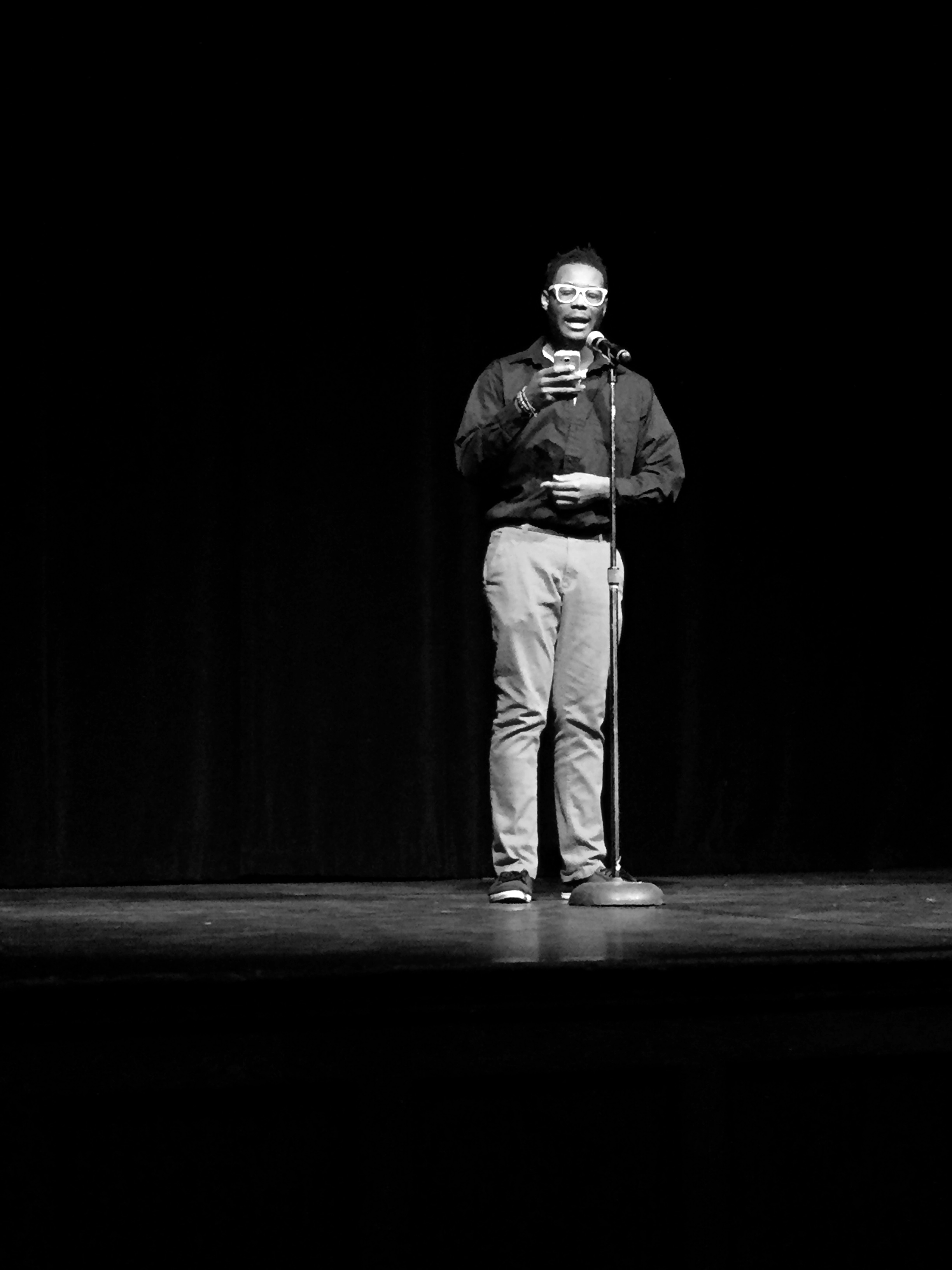Photos by Ayla Safran '19
Josh Salzburg (left), Jocelyn Mosman ’17 and Katie Carlson ’18 (middle) and Sheldon Gaynor (right) perform in Chapin Auditorium at the Five College Poetry Slam, hosted by MHC’s Conscious Poets Society on Saturday, April 9, 2016.
BY ANISHA PAI '19
The Conscious Poets Society organized their third annual Five College Poetry Slam on April 9, the Saturday of Mount Holyoke’s admitted students weekend. Chapin Auditorium was lightly packed with a crowd of both admitted and five-college students. Fourteen five-college student poets competed in three rounds.
Before the event, Ariela Schnyer ’16, co-chair of CPS, predicted that the audience would hear a variety of poetic styles. “It can be free form, it can be rhyming, it can really be anything that the poets want,” she said.
Audience members Nyasha Franklin ’19 and Epyana Smith ’18 speculated that the poets would cover themes such as trauma, the ownership of women’s bodies, cultural appropriation and pro-blackness. “Somebody might be cute and throw a love poem in there,” said Smith, chuckling.
The slam was judged by five randomly picked audience members. Katie Carlson ’18, Five College Representative of CPS and the event’s emcee, explained that novice judges are a tradition of poetry slams. “You don’t want someone who’s going to dock people because they’re not writing a sonnet and because the rhyme scheme’s off,” she said. “I love seeing the gut reaction of people who are novices at poetry.” The judges ranked the poets on a scale from 0–10. None of the contestants got ranked below a seven. Three of the five judges were admitted students and one was a visiting student’s younger sister.
The night began with a hiccup — some of the poets didn’t show up and organizers asked for volunteers to take their places. “The number kept fluctuating,” said Carlson. “We had some [admitted students] that came up and performed and that was just such a magnificent experience because they’re now exposed to poetry at MHC.”
Initially, the Conscious Poets Society planned on organizing pre-qualifying slams in each of the five colleges, however, this idea failed to garner support from college poetry organizations. Carlson said, “You can’t really go into another college and say ‘You need to organize a slam!’” Instead, in order to attract a variety of poets, they advertised in the wider Pioneer Valley. “People kind of come out of the woodwork,” said Schnyer, “like ‘I’ve never performed before but I really want to!’”
In addition to performers from Hampshire, UMass, Mount Holyoke and Smith, three visiting students performed as well. Carlson and her co-host, Jocelyn Mosman ’17, encouraged the crowd to “be boisterous” and snap, as is the common poetry slam etiquette. By the third performance, the crowd was riddled with supportive snapping, foot stomping and shouts of “Slay poet!”
By the third round, there were three finalists: Sarah Hill, a sophomore from Smith College, Nathalie Irmer, a sophomore from UMass and Brandy Williamson ’18. They tied and decided to split the $200 cash prize and bouquet of 24 roses between themselves.
Hill, who performed her first poem last March, said, “I’ve just accepted that poetry is the love of my life.” She performs twice a month in Northampton and writes poems from a place of honesty. “I’m really conscious about what I want to be saying to the world and it’s a privilege to stand in front of a microphone,” she said.
One of the visiting students who performed, Camille Olivierre, said of the experience, “I loved it. I love this community, they were so accepting, so amazing,” as she was whisked out of Chapin by her host and a group of MHC students. Olivierre made it to the second round of the slam and recited her first poem about summer time and body shaming and her second about West Indian women.
Performing on the Chapin stage was like “talking into this black abyss,” said Hill, due to an inability to see the audience over the bright lights. “I was alone and I think that really helped me to take down some walls and just perform.”
Carlson, who prefers playing off audience reactions, felt disoriented, saying, “it was difficult because you don’t know what they’re thinking, you can’t hear anything or see anything.”



